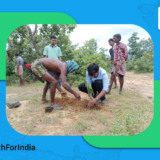
Know How You Can Bring Change and Development in Rural Society
Are you considering what it will take for you to bring change to rural India? We present Seva Mandir, an SBI YFI partner NGO’s perspective on change and development in rural society.
What kind of training is required, and what essential qualities would help him/her to effectively contribute to rural development projects?
The most important qualities needed in anyone wanting to contribute effectively to change and development in rural society are empathy, sensitivity for the poor, flexibility, openness to learning, and the ability to respect various points of view. Exposure to life in village conditions itself is one of the most powerful training inputs. Spending time in rural settings will give the person first-hand exposure to rural lives, rhythms and realities. At the same time, he or she will also benefit from reading up on existing literature, including what Mahatma Gandhi has written about villages. Last and, maybe the most important, is the recognition that to see any kind of change and development in rural society is a slow process, and the person should not be impatient for results.
Also Read: Environment And Sustainable Development Project
What challenges should one expect while working on rural development projects?
Rural situations expose one to problems for which most other professional training provides little preparation, which would make many qualified professionals feel out of place. The biggest challenge of course is that of the nature and pace of change. Social change processes are complex and slow. While setting up a rural enterprise or planting some trees or running a school are more doable and tangible changes that can be made, the real change in terms of making our society more just and caring takes longer. And the road is not just forward, but it is a series of backward and forward steps. Anyone wanting to enter this field must have the understanding of these deeper processes.
The other challenge is that often education makes us feel that we know better than the poor, and we make the mistake of treating the poor as ignorant and illogical. We also tend to reduce development to just going and telling the poor what is the ‘right’ thing to do, be it in agriculture, education, health, or any such field. Here, one does not adequately recognise the multiple constraints that influence their actions. We expect the poor to change once they are made ‘aware’. This is an analysis, which is very inadequate, and we need to recognise that the poor are also rational and wise. Using technological lenses alone to view development can therefore become a challenge.
Also Read: Challenges of Rural Development Programs in India
What essential traits are needed to successfully work on rural development projects?
Willingness to listen and learn is the precursor to effective management and implementation. The commitment to stay in the field, roll up one’s sleeves and work alongside rural people, and an overall willingness to transcend hierarchies of social class and background, can advance projects and create great personal insight and maturity. At the same time, grassroots rural development requires one to return to the boardroom with a great deal of vision and pragmatism, especially in fundraising, advocacy with civil society and government stakeholders, and the institutionalization of programs.


